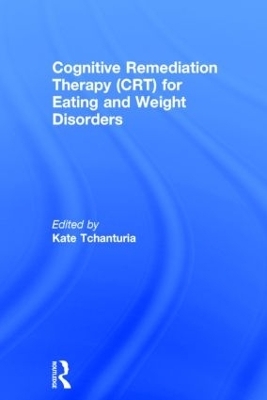
Cognitive Remediation Therapy (CRT) for Eating and Weight Disorders
Routledge (Verlag)
978-1-138-79402-3 (ISBN)
The effective treatment of anorexia nervosa (AN) remains a significant challenge. This has prompted new research into ways of engaging and keeping patients in treatment and ultimately achieving better outcomes, not only on a symptomatic level but also in broader aspects of life. In this book Kate Tchanturia brings together international experts from the field of eating disorders to discuss the effectiveness of cognitive remediation therapy for treating anorexia nervosa, and keeping patients in therapy.
Cognitive Remediation Therapy (CRT) is a type of therapy that concentrates on improving neurocognitive abilities such as attention, working memory, cognitive flexibility and planning, and executive functioning which leads to improved general functioning. Recent research has demonstrated the effectiveness of the approach for treating those with anorexia nervosa, cognitive improvements have been noted in patients, and the approach is associated with low drop-out rates from the treatment, and high levels of acceptability among both patients and therapists.
This book presents research focussing on:
- individual therapy with adults
- family-based therapy
- CRT with young people
- group format of CRT
- adapting interventions for people with co-morbidities
- clinicians experiences working with CRT
Illustrated throughout with case studies, and integrating neuropsychological testing and brain imaging this book discusses the latest research on this novel treatment approach. It will be key reading for researchers and academics in the eating disorders field wanting to trial the approach, as well as final year undergraduates and postgraduate clinical psychology students looking for a new perspective.
Dr. Kate Tchanturia is a Reader in the Psychology of Eating Disorders and a Consultant (Lead) Psychologist at King’s College London, and at South London and Maudsley NHS Trust National Adult Eating Disorder Service, London, UK. Kate is a Fellow of the Academy of Eating Disorders and an Associate Fellow of the British Psychological Society.
Introduction: Why CRT for Eating and Weight Disorders, Kate Tchanturia. Cognitive Profiles in Adults and Children With Anorexia Nervosa and How it Helped us to Develop CRT for Anorexia, Kate Tchanturia, Katie Lang. Individual Format of CRT Complex Cases. A Case Study of CRT With an Inpatient with Anorexia Nervosa, Caroline Fleming and Kate Tchanturia. Adapting CRT to Increase Awareness of Thinking Styles in People with Severe Anorexia and Comorbid Disorders, Amy Harrison, Kate Tchanturia. Cognitive Remediation Therapy (CRT) for Anorexia in Group Format: An Evaluation From an Adult Population, Kate Tchanturia, Emma Smith, Clinicians’ Experiences of Cognitive Remediation Therapy - a Qualitative Study, Naima Lounes, Kate Tchanturia. Randomised Controlled Trials. Cognitive Remediation Therapy for Patients with a Severe and Enduring Eating Disorder, Alexandra Dingemans, Unna Danner, Eric Van Furth. Comprehending and Fostering Cognitive-Behavioural Flexibility in Anorexia Nervosa, Hans-Christoph Friederich, Timo Brockmeyer. Adaptations of CRT in Young People with AN. Cognitive Remediation Therapy with Children and Adolescents, Kathleen Kara Fitzpatrick, James D. Lock. Evaluation of a Cognitive Remediation Therapy Group for Adolescents with Anorexia Nervosa in a Day Patient Setting, Natalie Pretorius, Jonathan Espie, Mima Simic. New Developments Ideas Worth Researching: CRT in the Context of Family Therapy. Family Cognitive Remediation Therapy for Child and Adolescent Anorexia Nervosa, Suzanne Hutchison, Alice Roberts, Bryan Lask, Future Developments of Remedial Therapies fMRI Studies; Leon Fonville, Nick Lao-Kaim, Kate Tchanturia. Cognitive Remediation Therapy Adaptation for Obesity, Evelyn Smith, Phillipa Hay, Jayanthi Raman. Cognitive Remediation Therapy for Anorexia Nervosa: How do we Know it Works? Kate Tchanturia, Heather Westwood, Helen Davies, Developing Cognitive Remediation Therapy – Lessons from the Field of Schizophrenia, Clare Reeder, Til Wykes. Appendix. Useful Clinical Tools Weblinks and Outcome Measures.
| Erscheint lt. Verlag | 31.10.2014 |
|---|---|
| Zusatzinfo | 23 Tables, black and white; 22 Line drawings, black and white; 22 Illustrations, black and white |
| Verlagsort | London |
| Sprache | englisch |
| Maße | 156 x 234 mm |
| Gewicht | 521 g |
| Themenwelt | Medizin / Pharmazie ► Medizinische Fachgebiete ► Psychosomatik |
| Medizin / Pharmazie ► Medizinische Fachgebiete ► Psychiatrie / Psychotherapie | |
| ISBN-10 | 1-138-79402-3 / 1138794023 |
| ISBN-13 | 978-1-138-79402-3 / 9781138794023 |
| Zustand | Neuware |
| Haben Sie eine Frage zum Produkt? |
aus dem Bereich


